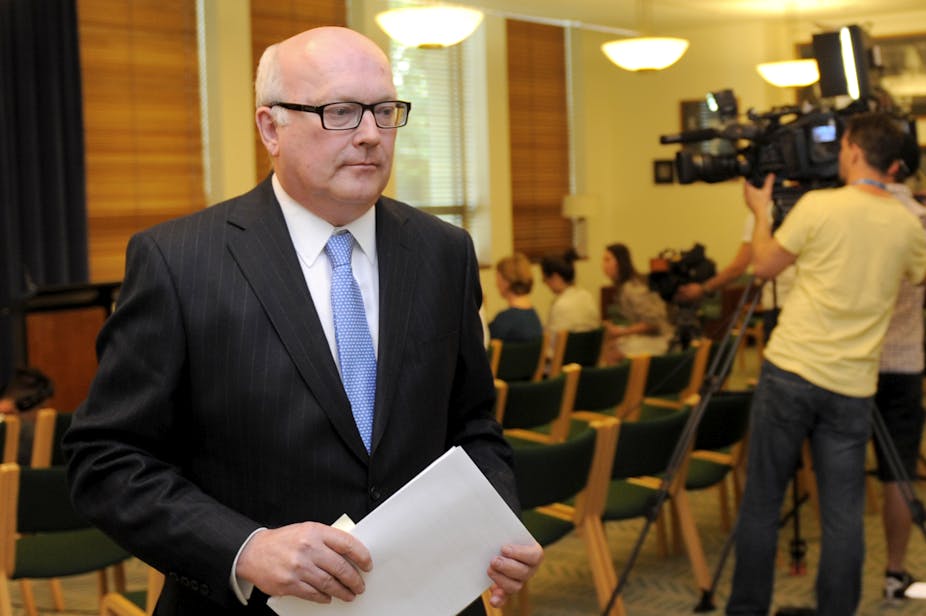Federal attorney–general George Brandis has announced his intention to consult relevant parties before acting on his pre-election promise to reform Australia’s prohibition on offensive racial acts under Section 18C of the Racial Discrimination Act (1975).
The move has already drawn opposition from Indigenous and ethnic groups, who, in an open letter, argue:
We oppose absolutely any such change. Paradoxically for free speech advocates, racial vilification can have a silencing effect on those who are vilified.
Brandis should look carefully before he leaps. Since Section 18 was introduced in 1995, Australia’s courts have successfully balanced freedom of expression with the right not to be racially abused in the few prosecutions under this law. Reform – or worse, abolition – of the race hatred laws could be a retrograde step to the detriment of wider freedoms in Australia.
Racial hate laws and multiculturalism
At the Australian Human Rights Commission, we know how important the prohibition of racial abuse is to the Australian community. Last year, the commission received a 59% increase in complaints about racial abuse in the workplace, on radio, on public transport and at football matches. The phenomenon of racial abuse is now evident, as an iPhone can capture an incident and send it “viral”.
In stark contrast, the commission might receive one or two complaints per year alleging violation of the right to freedom of expression.
While a rare occurence, the anti-Semitic attack late last month in Sydney – where five Jewish people were physically and verbally assaulted – demonstrates the need for laws to protect against racial abuse and violence.
The freedom of speech debate
Views are polarised that Section 18C either restricts the right to freedom of speech or is a necessary protection against racially offensive behaviour in multicultural Australia. Shadow attorney-general Mark Dreyfus, for instance, argued that:
When Senator Brandis says that repealing these laws is in the interests of freedom of speech, what he really means is freedom to engage in public hate speech.
A middle ground can, however, be found that balances freedom of speech with prohibition of racial abuse. Any reform to Section 18C should aim to find that balance.
While Australians know they have a right to freedom of speech, they are unlikely to know that we have few explicit protections of this freedom. The Constitution does not mention it and Australia has no legislative Charter of Rights, unlike other comparable nations such as the US.
Instead, in the tradition of the common law, the High Court has implied a right to freedom of political communication as a necessary means of participation in democratic society. Ironically, Sections 18C and 18D provide one of the few explicit protections of the right to freedom of speech.
The Bolt case
The cause célèbre that stimulated calls for reform was the decision in Eatock v. Bolt in 2011. The Federal Court found that newspaper columnist Andrew Bolt had acted unlawfully in reporting that fair-skinned Aboriginals abused their identity to claim welfare benefits.
The court reached two vital conclusions. First, Bolt had acted in a way that was reasonably likely to “offend, insult, humiliate or intimidate a person in public on the basis of his race, colour or national or ethnic origin”, contrary to Section 18C.

Secondly, the court applied Section 18D, which ensures artistic works, scientific debate and fair comment are exempt from prosecution. But Bolt could not claim the benefit of free speech because he had not acted reasonably or in good faith and because his report was neither fair nor accurate. In short, Bolt’s right to freedom of speech was restricted because his journalism was an abuse of that right.
The Bolt decision demonstrates a key point. The right to freedom of speech in Australia is not and never has been an absolute one. It is subject to many restraints including laws on defamation, blasphemy, and contempt of parliament.
In practice, the courts have always demanded more than “mere slights” that have caused offence. Rather, they have found an act unlawful only where it has had “profound and serious effects” of offence, well beyond trivial insults.
The Australian courts have struck the right balance when considering prosecutions for “offensive” acts in respect of Holocaust deniers on the internet, taunts that the police are “corrupt”, obscene cartoons, and, most recently, derogatory letters to the families of Australian soldiers killed in Afghanistan.
Public and political debate
The focus for public and media debate about Section 18C has been that the words “offend and insult” put the test for unlawfulness at too low a threshold. It is argued that the words “humiliate and intimidate” set the bar at the right level, while words such as “vilify” or “hatred” might also be inserted.
We are shadow-boxing to the extent that we do not yet have a draft bill of the proposed amendment. We have had pre-election promises by now-prime minister Tony Abbott and Brandis either to amend Section 18C or to repeal it. But if 18C was to be repealed, 18D would necessarily have to be deleted, because its purpose is only to provide exemptions to 18C. Perhaps we have yet to fully understood the consequences of repealing 18C.
By contrast, if all that is intended is to amend Section 18C by deleting the words “offend and insult”, then Section 18D can remain in place.
So far, Brandis has employed his undoubted advocacy skills to argue that robust – even hurtful – public comment is part of the cut and thrust of Australian life. To the contrary, it is hard to see how abusive and offensive speech can advance the right to participate in a representative democracy.
Brandis should tread carefully with his reform agenda in this area. Race hatred laws have been a foundation for Australia’s enviable multicultural society, and we should reform them on the basis of objective evidence, while remaining mindful of their symbolic value.

